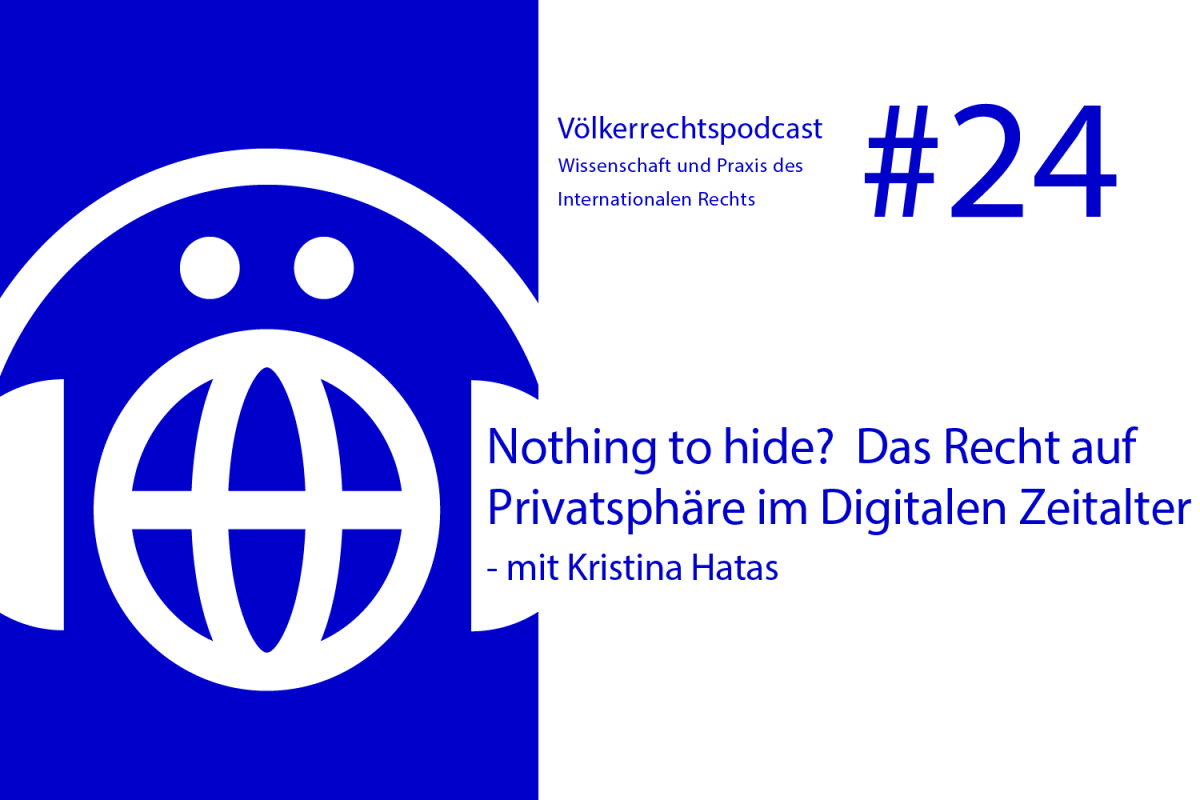#24 Nothing to hide? Das Recht auf Privatsphäre im Digitalen Zeitalter
„Niemand darf willkürlichen oder rechtswidrigen Eingriffen in sein Privatleben […] und seinen Schriftverkehr […] ausgesetzt werden“, so steht es in Artikel 17 des UN-Zivilpakts. Doch welche Bedeutung hat dieses Recht noch im Zeitalter der Digitalität? Isabel Lischewski erklärt im Grundlagenteil, warum der Individualrechtsschutz gegen staatliche Überwachungsmaßnahmen auch möglich ist, wenn man nicht nachweisen kann, dass man individuell betroffen ist. Erik Tuchtfeld hat mit Kristina Hatas über die verschiedenen Vektoren gesprochen, die das Recht auf Privatsphäre im Digitalen Zeitalter beeinträchtigen können: Staatliche Massenüberwachung, intensive Eingriffe im Einzelfall – wie „Staatstrojaner“ – und das Tracking durch Private im „Überwachungskapitalismus“.
Wir freuen uns über Lob, Anmerkungen und Kritik an podcast@voelkerrechtsblog.org. Abonniert unseren Podcast via RSS, über Spotify oder überall dort, wo es Podcasts gibt.
Hintergrundinformationen:
- EGMR, 06.09.1978 – 5029/71, Klass ./. Germany
- BVerfG, 27.02.2008 – 1 BvR 370/07, Grundrecht auf Gewährleistung der Vertraulichkeit und Integrität informationstechnischer Systeme
- UN, Hoher Kommissar für Menschenrechte, 16.06.2011 – A/HRC/17/31, Guiding Principles on Business and Human Rights
- Erik Tuchtfeld, Das Recht auf Schutz der Privatsphäre im Cyberspace, StudZR WissOn 2018, 389
- UN, Hoher Kommissar für Menschenrechte, 12.08.2021, Spyware scandal: UN experts call for moratorium on sale of ‘life threatening’ surveillance tech
- UN Generalversammlung, 15.12.2022 – A/RES/77/211, The Right to Privacy in the Digital Age
- Amnesty International, 29.09.2022, Myanmar: The social atrocity: Meta and the right to remedy for the Rohingya
- Amnesty International, 26.10.2022, Towards a global moratorium on targeted surveillance technology
Moderation: Erik Tuchtfeld, LL.M. (Glasgow) & Sophie Schuberth
Grundlagen: Dr. Isabel Lischewski
Interview: Kristina Hatas, LL.M. & Erik Tuchtfeld, LL.M (Glasgow)
Schnitt: Daniela Rau
Credits:
Deutscher Bundestag, Konstantin von Notz, 28. Januar 2021, gefunden über OpenParliament.TV

Erik Tuchtfeld is a research fellow at the Max Planck Institute for Comparative Public Law and International Law (Heidelberg) and head of the humanet3 research group. He is an editor at Völkerrechtsblog.

Sophie Schuberth is a research fellow and PhD-candidate at Freie Universität Berlin, working in the Berlin Potsdam Research Group ‘The International Rule of Law- Rise or Decline?’. She is an editor at Völkerrechtsblog.

Philipp Eschenhagen is a research associate at Bucerius Law School and a PhD candidate at the Walther Schücking Institute for International Law. He is an editor at Völkerrechtsblog.


Dr. Isabel Lischewski is an Editor and Podcast Co-Host at Völkerrechtsblog as well as a post-doctoral researcher focusing inter alia on gender, governance, and education in international and German public law at University of Münster.